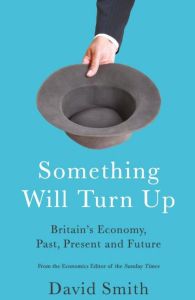Acesse a sua conta getAbstract para obter o resumo!

Acesse a sua conta getAbstract para obter o resumo!
David Smith
Something Will Turn Up
Britain’s Economy, Past, Present and Future
Profile Books, 2015
Sobre o que é?
An overview of modern British economic history from the economics editor of The Sunday Times.
Recommendation
The Sunday Times economics editor David Smith presents a readable, informative history of the British economy since World War II. As a prominent journalist covering economic matters, he draws on a wealth of knowledge and anecdotes. His treatment of the decades of the 1970s and 1980s, in particular, provides a most interesting read. Though written before the Brexit vote, Smith’s straightforward account of a significant chapter in the United Kingdom’s history offers a wise and well-balanced perspective. This is a straightforward historical account without an opinionated viewpoint; little here is personal or contentious. getAbstract recommends this enjoyable overview to students, professors, investors and history buffs.
Summary
About the Author
Economics editor of The Sunday Times David Smith also wrote The Dragon and the Elephant and Free Lunch.



















Comment on this summary